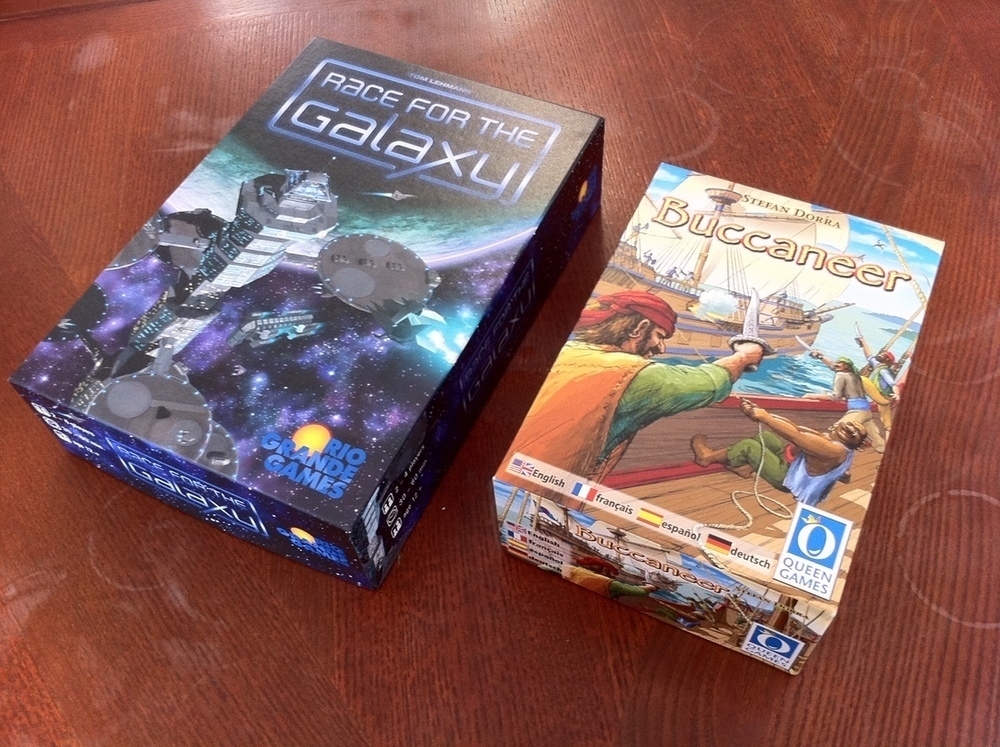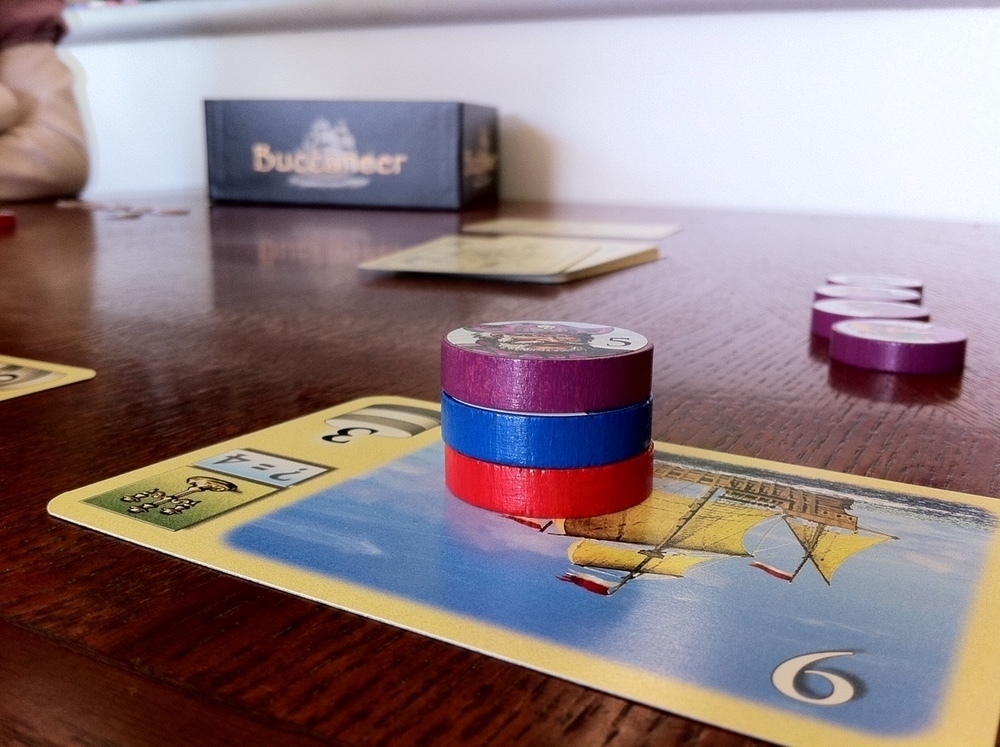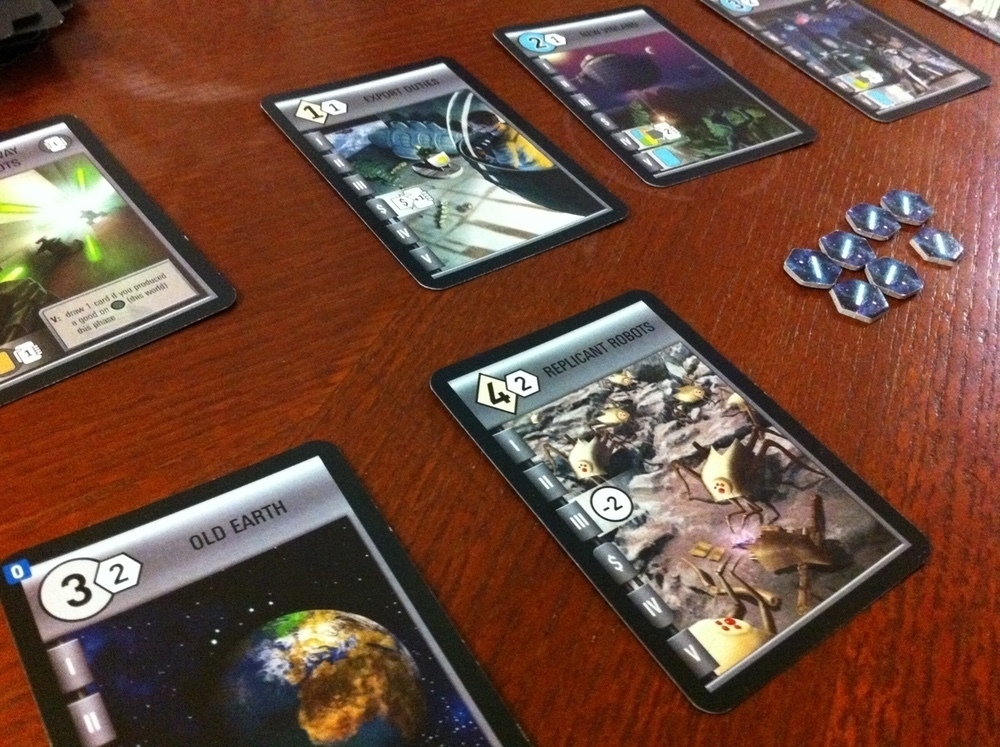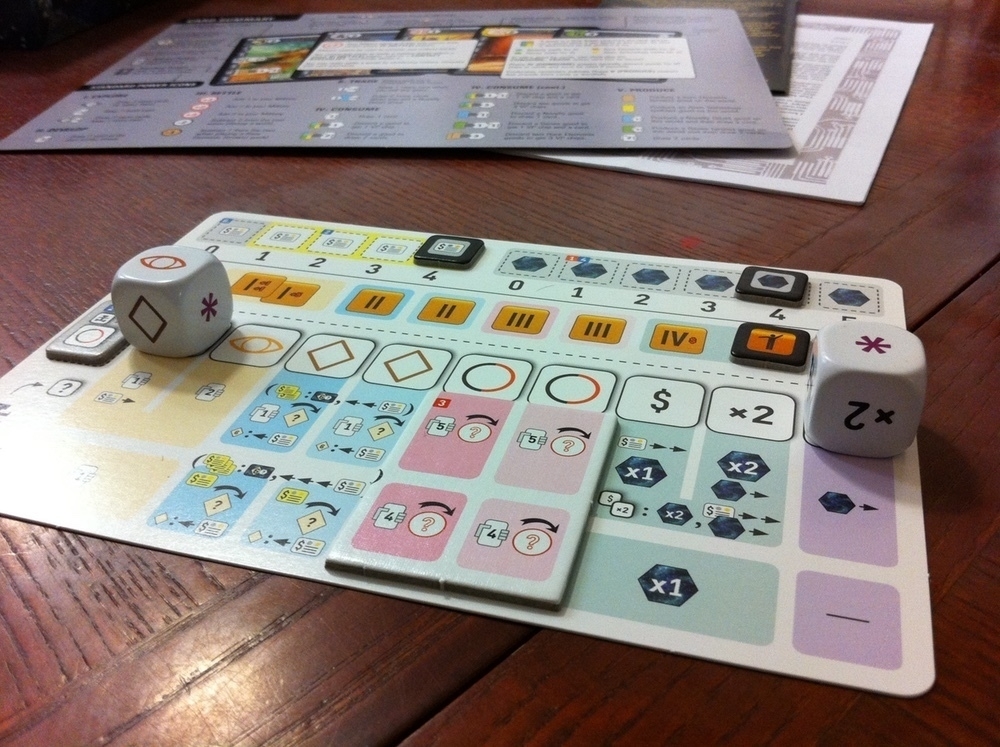
Following on from our earlier experiences, we’ve continued to add to our little collection of board games; and I’m now a regular tyre-kicker at the Wargames Supply shop not far from work. It’s a pretty nerdy1 shop (I once thought some besuited chaps were re-enacting an episode of the IT Crowd in there—EIFFEL TOWER!—but no, they REALLY WERE playing a role-playing game in public!) but the staff are nice and there’s a great range of board games.
Anyway, I’ve picked up a couple new ones from there in the last few months, and they’ve both met with success.
The first is one called Buccaneer, which I got for the kids. We all like it.

In this game you are of course, a Pirate/Buccaneer/Seeräuber (depending on which edition of this game you find - there are three different named versions) attacking ships as they come into port. Yes, you’re a land-based pirate.
But in order to take a ship (here represented by a lovely card) you have to assemble as many crew as the ship requires (in the case above, three). Each player has five pieces representing crew members, each with a different value. You crew up by choosing a crew member from some other player, stacking one of your crew members on top of one of their crew members or stacked crew members. Around the table in turn players stack up crews, taking the stacks of others too, until they have a large enough crew in one of their own stacks to take the ship that’s in play.
But! There’s a slight twist: the ship taken, you now have to pay off your pirate crew. And paying out those couple of captains that you forgot were at the bottom of the stack has just wiped out your profits…!
And so, after all the ships have been taken, you count up the gold (there’s a few bonuses as well) and see who has won.
R₂ (7) in particular likes this game—the pirate aspect is a winner—but B₂ (10) is a bit of a fan too, and can beat her parents on a regular basis. It also, like many of these German style games, doesn’t take a heck of a long time to play. So WIN all round.
The next game I have developed something of an obsession with. It’s Race For The Galaxy, a card game. You’re trying to build a galactic civilisation out of cards (surely doomed to failure, right?); each card representing one of those science fictional ideas like colony ships; lost alien artefacts of power; space marines; planets with different kinds of export and import requirements etc etc; but also more prosaic and possibly more-likely-to-exist-in-the-future ones like interstellar banks and export duties.

You have a hand of cards; you build by placing cards from your hand into your tableau in front of you. Placement carries a cost (in discards); different types of cards can only be placed in different game phases. There are five phases: Explore, Develop; Settle; Trade; Consume, and Produce; cards in your tableau affect your actions positively or negatively in each phase… well I could go on, but suffice to say that the rules are complex, at least in the first few plays (something that has been known to put more than a few people off it) but it is completely worth persisting with, in my opinion.
Despite this complexity R. and I can cut out a game in about half an hour now. The nice thing is that we’re evenly matched as well (though I’ve had to forgo the extra practice I could have gotten on one of the several online versions of the game, so that we stay evenly matched2) which makes the whole thing pretty interesting.
The complexity also ensures that there are a number of winning strategies that can be followed. Victory can be had by placing lots of cards really quickly; by setting up an economy that generates lots of cash; by taking lots of planets using military; by strategic placement of the six-cost development meta-cards (e.g., you might be able to place an Alien Tech Institute card, which gives you two and in some cases three points for every Alien card in your tableau, thus making explicit the value to your civilisation of specialisation in that particular technology or cultural idea). Or by any combination of these and more.
So not only is the outcome uncertain, the strategies we both use are unpredictable as well. I like this level of variation a lot.
It’s also a game that lends itself well to analysis. Having noted some people on Board Game Geek who have been tracking all their games played, scores, and Start Planets (the initial card in your tableau is a randomly-chosen-out-of-a-special-series planet that sometimes informs the sort of strategies you should pursue) I’ve been tracking mine using a Google Spreadsheet and graphing the results. There’ll be an excuse for tedious analysis once I build up the number of my games.
And finally, there’s also a solitaire variant where the mechanical opponent is tracked via means of a scorecard. I find this version very hard to defeat, though I don’t play it very often.

I’ve not come across a game before that’s so thoughtfully put together, and so replayable3. I’m pretty sure I’ll be playing this for years; others have clocked up thousands of plays. And if the base game starts to pale, there’s the three expansions4.
Definitely the find of the year for me.
-
Pot / Kettle, etc etc. ↩︎
-
I’m assuming that I would get better than R. and stay ahead of her if I was to practise more - and that might not be true. She’s too damned smart on puzzles and games. ↩︎
-
This chap writes far better than I on why the game works so well. ↩︎
-
The first of which has the solo variant. ↩︎